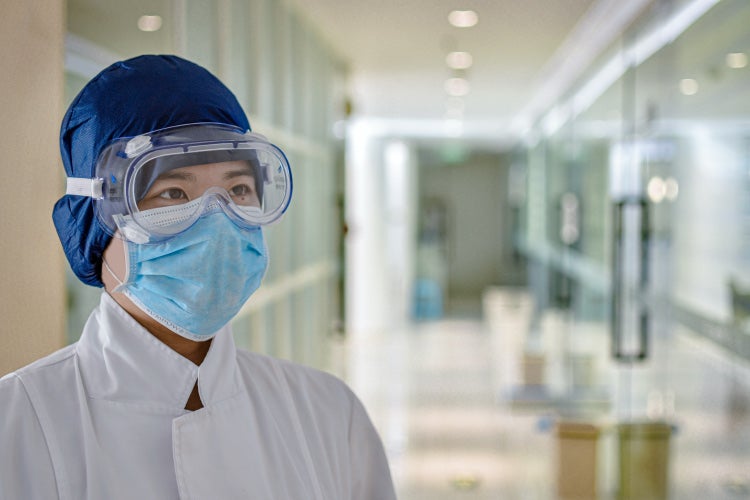News Feature: Healthcare and Coronavirus (Part 1)
Transcript of the podcast:
00:00 Speaker 1: Thank you for plugging into this Family Life News podcast streaming issues-driven family focus news.
00:08 Speaker 2: We've been talking about this coronavirus, it seems like years now. It's only been weeks but it's affecting hospitals and medical personnel, especially. So, what can hospitals and staff do to really prepare for this potential deluge of cases that might be coming in as we get more confirmed cases?
00:28 Speaker 3: Hospitals and staff can be prepared by, first and foremost, providing clear and frequent communication. As we are getting new information everyday, it's gonna be important for staff to learn about new policies and information related to care and processes. This is gonna be a critical point for them. Also, it allows them to be empowered and well-prepared, so it's gonna reduce stress and errors as we start to care for these patients, as they're coming in. So daily meetings for planning and needs assessment should be really a common practice at this point in facilities. I think they can be prepared by also effective training on how to recognize and respond to COVID-19 and how to properly use equipment that they potentially have not used ever before or haven't used in a long time. We're already seeing that in order to maintain preventative measures and preserve resources, facilities are canceling non-urgent procedures. They're implementing telehealth which is allowing patients to meet with their providers by phone or video conferencing and we're seeing some drive-through care all around the country that allows patients to drive up to a provider and be assessed or treated without getting out of their car.
01:40 S3: We also are seeing facilities have created or transitioned existing units to be COVID units, so the hospitals all have COVID units where we can regionalized the care for these patients. So the preparation has been excellent.
01:53 S2: You mentioned some of the different things that are going on, and specifically within these probably daily briefings, these meetings, there's measures in place, there's things that the CDC has recommended for everyone, hospital staff, I'm sure included of handwashing and proper measures especially covering your coughs and sneezes. Are there any other things that medical staff can do to make sure that they stay healthy as they are, I mean, right there by this virus on a daily basis?
02:21 S3: Absolutely, so as you know, one of the most significant tools for fighting illness is a healthy immune system. And so, nurses are notorious for pushing themselves and caring for others over self-care. So this is a really important question. There are some strategies to build immunity and stay healthy. Of course, you mentioned the strict handwashing practices. So using that foam soap for 20 seconds, that's gonna be critical. Adequate hydration, at least eight to 10 glasses of water a day, but you know, sleep and stress are big influencers of the immune health, so getting seven to nine hours of sleep at night is critical. This is when the body produces and releases proteins that actually target infection and inflammation.
03:05 S3: So, if nurses or medical staff can't get those seven to nine hours, taking a couple of naps throughout the day, 20-minute naps would be a great help to them to kind of repair the body and prepare it. Also, stress-reducing practices like deep breathing, even one-minute breaks throughout the day of deep diaphragmatic breathing can impact the immune system. Aerobic activity is great. Walking, it can decrease stress, it improves mood, decreases anxiety and depression that we might see especially as we're waiting for these patients. Walking off the unit for a few minutes can help to just clear the mind and refocus, again, decreasing stress that's building up, and laughing is probably one of the best medicine.
03:50 S3: We've heard this before but laughing actually increases immune cells and infection-fighting antibodies. So watching funny movies, playing games, and laughing with friends and family is a great way to decrease stress and actually build the immune system. And nutrition is a big part of this, it's a major part of immune health, especially vitamins A, C, and D, and zinc. So we can get these from foods like lots of fruits and vegetables, citruses, berries, dark green leafy vegetables. But when we can't get these vitamins and these nutrients from concentrated foods, supplements are an excellent substitution. So I would just advise people to talk with their doctors about dosing for these supplements, but that is a great way to boost your immune system. Also, staying away from processed and artificial sugars which actually break down the immune system is gonna be important. So, trying to avoid those donuts that are uber hot in the morning or that piece of pizza that somebody left will help to increase immune system. And actually 90% of the immune system is gut health, so probiotics can be really helpful for many people.
04:56 S2: One of the concerns I hear coming out of a lot of hospitals is the lack of supplies, or based on what they project as far as the number of patients that could come in in the coming weeks, running out of certain supplies, be it ventilators, masks, hospital beds, that sort of thing. What can hospitals do to prepare for that? Or are there other measures that they can put into place if the inevitable does happen and they run out of necessary supplies?
05:23 S3: So the CDC has provided some excellent guidelines for personnel as supplies run low or as they run out. Again, some of these preparations we've already talked about earlier that are designed to preserve supplies and other measures, but we can also increase bundling of care of patients, which means that providers will go into the room doing more at one time, making less visits, and that way using less resources for each time that they go in. We're seeing that the CDC is recommending that, if needed, we can extend the use of equipment beyond the typical recommended expiration date. Using tissues for patients to cover their face and their noses will help to reserve masks for healthcare providers, and there are special filtration systems or ventilated headboards that can be used that actually draw the exhaled air to a filter to protect the providers better if they have to go in with decreased or no protection at all. We're also seeing that the FDA has more flexible regulations now to allow for quicker mass production of supplies by the design, automotive, and fashion companies among others, and this is gonna really help to fill that void.
06:31 S3: As we kind of look down the road, hopefully, this won't happen but if it does and we really are seeing no supplies, we will start to decrease members to healthcare fields who are at higher risks. So older people, pregnant people, people with chronic illnesses that are actually providers, we'll go ahead and take them out of the system, so we're gonna protect them and we're gonna reserve those protection supplies for others. And we're seeing a lot of homemade masks being made now across the country using scarfs, bandannas, things like that, to prepare for potential loss of supplies.
Click here to download the podcast.



